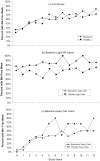Randomized, placebo-controlled trial of bupropion for the treatment of methamphetamine dependence
- PMID: 18468815
- PMCID: PMC3652530
- DOI: 10.1016/j.drugalcdep.2008.03.010
Randomized, placebo-controlled trial of bupropion for the treatment of methamphetamine dependence
Abstract
Objective: To compare bupropion to placebo for reducing methamphetamine (MA) use, increasing retention, and reducing the severity of depressive symptoms and MA-cravings. A secondary objective compared bupropion to placebo for reducing cigarette smoking among MA dependent participants.
Methods: Following a 2-week, non-medication baseline screening period, 73 treatment-seeking MA dependent participants were randomly assigned to bupropion sustained release (150 mg twice daily; N=36) or placebo (twice daily; N=37) for 12-weeks under double-blind conditions. Participants attended clinic thrice weekly to provide urine samples analyzed for MA-metabolite, to complete research measures and assessments, and to receive contingency management and weekly cognitive behavioral therapy sessions.
Results: There were no statistically significant effects for bupropion relative to placebo on MA use verified by urine drug screens, for reducing the severity of depressive symptoms or MA-cravings, or on study retention. In a post hoc analysis, there was a statistically significant effect of bupropion treatment on MA use among participants with lighter (0-2 MA-positive urines), but not heavier (3-6 MA-positive urines) MA use during baseline (OR=2.81, 95% CI=1.61-4.93, p<0.001 for MA-free week with bupropion among light users). Bupropion treatment was also associated with significantly reduced cigarette smoking, by almost five cigarettes per day (p=0.0002).
Conclusion: Bupropion was no more effective than placebo in reducing MA use in planned analyses, though bupropion did reduce cigarette smoking. Post hoc findings of an effect for bupropion among baseline light, but not heavy, MA users suggests further evaluation of bupropion for light-MA users is warranted.
Figures



References
-
- Allison PD, SAS Institute . Survival analysis using the SAS system : a practical guide. SAS Institute; Cary, NC: 1995.
-
- Argyelan M, Szabo Z, Kanyo B, Tanacs A, Kovacs Z, Janka Z, Pavics L. Dopamine transporter availability in medication free and in bupropion treated depression: a 99mTc-TRODAT-1 SPECT study. J Affect Disord. 2005;89:115–123. - PubMed
-
- Beck A. Depression. University of Pennsylvania Press; Philadelphia, PA: 1967.
-
- Brown JM, Hanson GR, Fleckenstein AE. Cocaine-induced increases in vesicular dopamine uptake: role of dopamine receptors. J Pharmacol Exp Ther. 2001;298:1150–1153. - PubMed
-
- Budney AJ, Higgins ST, Hughes JR, Bickel WK. Nicotine and caffeine use in cocaine-dependent individuals. J Subst Abuse. 1993;5:117–130. - PubMed

